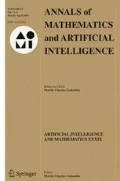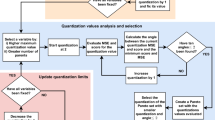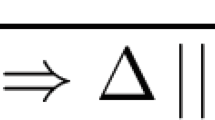Abstract
The “Most Probable World” (MPW) problem in probabilistic logic programming (PLPs) is that of finding a possible world with the highest probability. Past work has shown that this problem is computationally intractable and involves solving exponentially many linear programs, each of which is of exponential size. In this paper, we study what happens when the user focuses his interest on a set of atoms in such a PLP. We show that we can significantly reduce the number of worlds to be considered by defining a “reduced” linear program whose solution is in one-one correspondence with the exact solution to the MPW problem. However, the problem is still intractable. We develop a Monte Carlo sampling approach that enables us to build a quick approximation of the reduced linear program that allows us to estimate (inexactly) the solution to the MPW problem. We show experimentally that our approach works well in practice, scaling well to problems where the exact solution is intractable to compute.
Similar content being viewed by others
References
Applegate, D., Cook, W., Dash, S., Mevenkamp, M.: QSopt: a linear programming library for JAVA. http://www2.isye.gatech.edu/~wcook/qsopt (2009)
Black, M., Jepson, A.: A probabilistic framework for matching temporal trajectories: condensation-based recognition of gestures and expressions. In: Proceedings of ECCV ’98, pp. 909–924 (1998)
Damasio, C.V., Pereira, L.M., Swift, T.: Coherent well-founded annotated logic programs. In: Logic Programming and Non-monotonic Reasoning, pp. 262–276 (1999)
Dekhtyar, A., Subrahmanian, V.S.: Hybrid probabilistic programs. In: Journal of Logic Programming, pp. 391–405 (1997)
Delgrande, J.P., Liu, D.H., Schaub, T., Thiele, S.: COBA 2.0: a consistency-based belief change system. In: Proceedings of ECSQARU ’07, pp. 78–90. Springer, Berlin, Heidelberg (2007)
Eiter, T., Subrahmanian, V.S., Pick, G.: Heterogeneous active agents, I: semantics. Artif. Intell. 108(1/2), 178–255 (1999)
Fagin, R., Halpern, J.Y., Megiddo, N.: A logic for reasoning about probabilities. Inform. Comput. 87(1/2), 78–128 (1990)
Hailperin, T.: Probability logic. Notre Dame J. Formal Logic 25 (3), 198–212 (1984)
Halpern, J.Y.: An analysis of first-order logics of probability. Artif. Intell. 46(3), 311–350 (1990)
Jaumard, B., Hansen, P., de Aragão, M.P.: Column generation methods for probabilistic logic. In: Proceedings of the First Integer Programming and Combinatorial Optimization Conference, pp. 313–331. University of Waterloo Press, Waterloo, Ontario, Canada (1990)
Khuller, S., Martinez, M.V., Nau, D., Simari, G., Sliva, A., Subrahmanian, V.S.: Action probabilistic logic programs. Ann. Math. Artif. Intell. 51(2–4), 295–331 (2007)
Khuller, S., Martinez, M.V., Nau, D., Simari, G., Sliva, A., Subrahmanian, V.S.: Finding most probable worlds of probabilistic logic programs. In: Proceedings of SUM 2007, vol. 4772, pp. 45–59. LNCS. Springer (2007)
Lakshmanan, L.V.S., Leone, N., Ross, R., Subrahmanian, V.S.: Probview: a flexible probabilistic database system. ACM TODS 22, 419–469 (1997)
Lakshmanan, L.V.S., Shiri, N.: A parametric approach to deductive databases with uncertainty. IEEE TKDE 13(4), 554–570 (2001)
Leone, N., Scarcello, F., Subrahmanian, V.S.: Optimal models of disjunctive logic programs: semantics, complexity, and computation. IEEE TKDE 16(4), 487–503 (2004)
Lloyd, J.W.: Foundations of Logic Programming, 2nd edn. Springer (1987)
Lukasiewicz, T.: Probabilistic logic programming. In: Proceedings of ECAI ’98, pp. 388–392 (1998)
Lukasiewicz, T., Kern-Isberner, G.: Probabilistic logic programming under maximum entropy. LNCS (Proceedings of ECSQARU ’99), vol. 1638 (1999)
Mannes, A., Michael, M., Pate, A., Sliva, A., Subrahmanian, V.S., Wilkenfeld, J.: Stochastic opponent modelling agents: A case study with Hezbollah. In: Liu, H., Salerno, J. (eds.) Proceedings of the First International Workshop on Social Computing, Behavioral Modeling and Prediction (2008)
Mannes, A., Michel, M., Pate, A., Sliva, A., Subrahmanian, V.S., Wilkenfeld, J.: Stochastic opponent modeling agents: a case study with Hamas. In: Proceedings of ICCCD 2008 (2008)
Mannes, A., Subrahmanian, V.: Calculated terror. Foreign Policy (online edition). http://www.foreignpolicy.com/articles/2009/12/15/calculated_terror (2009)
Martinez, V., Simari, G., Sliva, A., Subrahmanian, V.S.: The soma terror organization portal (stop): social network and analytic tools for the real-time analysis of terror groups. In: Liu, H., Salerno, J. (eds.) Proceedings of the First International Workshop on Social Computing, Behavioral Modeling and Prediction (2008)
Montenegro, R., Tetali, P.: Mathematical aspects of mixing times in markov chains. FTTCS 1(3), 237–354 (2006)
Ng, R.T., Subrahmanian, V.S.: A semantical framework for supporting subjective and conditional probabilities in deductive databases. In: Furukawa, K. (ed.) Proceedings of ICLP ’91, pp. 565–580. The MIT Press (1991)
Ng, R.T., Subrahmanian, V.S.: Probabilistic logic programming. Inform. Comput. 101(2), 150–201 (1992)
Ngo, L., Haddawy, P.: Probabilistic logic programming and bayesian networks. In: Proceedings of the Asian Computing Science Conference ’95, pp. 286–300 (1995)
Nilsson, N.: Probabilistic logic. Artif. Intell. 28, 71–87 (1986)
Oh, S., Sastry, S.: Tracking on a graph. In: IPSN ’05: Proceedings of the 4th international symposium on Information processing in sensor networks, p. 26. IEEE Press, Piscataway, NJ, USA (2005)
Papadimitriou, C.H.: On selecting a satisfying truth assignment (extended abstract). In: SFCS ’91: Proceedings of the 32nd Annual Symposium on Foundations of Computer Science, pp. 163–169. IEEE Computer Society, Washington, DC, USA (1991)
SAT4J: A satisfiability library for JAVA. http://www.sat4j.org (2009)
Schöning, U.: A probabilistic algorithm for k-sat and constraint satisfaction problems. In: FOCS ’99: Proceedings of the 40th Annual Symposium on Foundations of Computer Science, p. 410. IEEE Computer Society, Washington, DC, USA (1999)
Selman, B., Kautz, H.A., Cohen, B.: Noise strategies for improving local search. In: Proceedings of AAAI ’94, pp. 337–343. MIT press (1994)
Selman, B., Levesque, H.J., Mitchell, D.G.: A new method for solving hard satisfiability problems. In: Proceedings of AAAI ’92, pp. 440–446 (1992)
Shapiro, E.Y.: Logic programs with uncertainties: a tool for implementing rule-based systems. In: Proceedings of IJCAI ’83, pp. 529–532 (1983)
Simari, G., Sliva, A., Nau, D., Subrahmanian, V.S.: A stochastic language for modelling opponent agents. In: Proceedings of AAMAS ’06, pp. 244–246. ACM, New York, NY, USA (2006)
Sliva, A., Martinez, V., Simari., G.I., Subrahmanian, V.S.: Soma models of the behaviors of stakeholders in the afghan drug economy: A preliminary report. In: Proceedings of the First International Conference on Computational Cultural Dynamics (ICCCD 2007). ACM press (2007)
Stroe, B., Subrahmanian, V.S., Dasgupta, S.: Optimal status sets of heterogeneous agent programs. In: Proceedings of AAMAS ’05, pp. 709–715. ACM, New York, NY, USA (2005)
van Emden, M.: Quantitative deduction and its fixpoint theory. J. Log. Program. 4, 37–53 (1986)
Wei, W., Selman, B.: Accelerating random walks. In: Proceedings of the 8th International Conference on Principles and Practice of Constraint Programming, pp. 216–232. Springer, London, UK (2002)
Yue, A., Liu, W., Hunter, A.: Measuring the ignorance and degree of satisfaction for answering queries in imprecise probabilistic logic programs. In: Proceedings of SUM ’08, pp. 386–400. Springer, Berlin, Heidelberg (2008)
Author information
Authors and Affiliations
Corresponding author
Rights and permissions
About this article
Cite this article
Simari, G.I., Martinez, M.V., Sliva, A. et al. Focused most probable world computations in probabilistic logic programs. Ann Math Artif Intell 64, 113–143 (2012). https://doi.org/10.1007/s10472-012-9285-y
Published:
Issue Date:
DOI: https://doi.org/10.1007/s10472-012-9285-y




